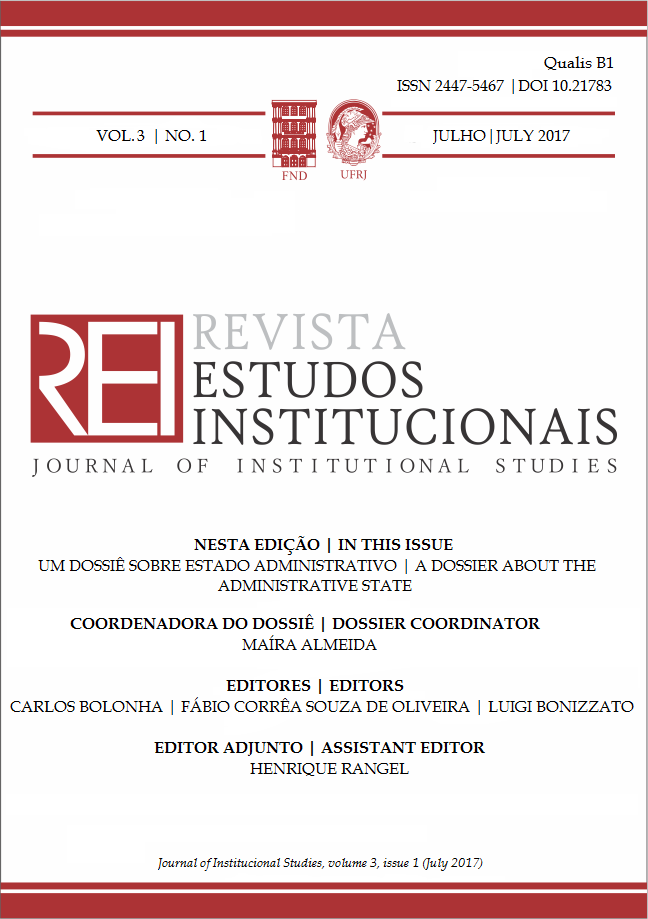RATIONALLY ARBITRARY DECISION IN ADMINISTRATIVE LAW
DOI:
https://doi.org/10.21783/rei.v3i1.152Keywords:
Agencies, Uncertainty, First-Order Reasons, Second-Order Reasons, ArbitrarinessAbstract
How should administrative law cope with genuine uncertainty, in which probabilities cannot be attached to outcomes? I argue that there is an important category of agency decisions under uncertainty in which it is rational to be arbitrary. Rational arbitrariness arises when no first-order reason can be given for the agency’s choice, yet the agency has valid second-order reasons to make a particular choice. When these conditions obtain, even coin flipping may be a perfectly rational strategy of decision making for agencies. Courts should defer to rationally arbitrary decisions. There is a proper role for courts in ensuring that agencies have adequately invested resources in information gathering, which may dispel uncertainty. Yet in some cases the value of further investments in information gathering will be genuinely uncertain. If so, courts should defer to agencies’ second-order choices about informational investments on the same grounds that justify deference to agencies’ first-order choices under uncertainty.Downloads
References
ALEXANDER, Kristina. Warranted but Precluded: What That Means under the Endangered Species Act (ESA). Congressional Research Service, CRS Report 7-5700, 2010.
AL-NAJJAR, Nabil I. A Bayesian Framework for the Precautionary Principle. Journal of Legal Studies, Vol. 44, S-2, 2015.
ARROW, Kenneth; HURWICZ, Leonid. An Optimality Criterion for Decision-Making under Ignorance. In: C.F. Carter; J.L. Ford (eds.). Uncertainty and Expectations in Economics: Essays in Honour of G.L.S. Shackle. Oxford: Oxford University Press, 1972.
BERTSIMAS, Dimitris; SIM, Melvyn. The Price of Robustness. Operations Research, Vol. 52, 1, 2004.
CALABRESI, Guido; BOBBITT, Philip. Tragic Choices. New York, NY: W.W. Norton & Company, 1978.
DIXIT, Avinash; PINDYCK, Robert. Investment under Uncertainty. Princeton, NJ: Princeton University Press, 1994.
DUXBURY, Neil. Random Justice: on Lotteries and Legal Decision-Making. Oxford: Oxford University Press, 2002.
EASLEY, David; KLEINBERG, Jon. Networks, Crowds and Markets: Reasoning about a Highly Connected World. Cambridge, MA: Cambridge University Press, 2010.
ELSTER, Jon. Solomonic Judgments: Studies in the Limitations of Rationality. Cambridge, MA: Cambridge University Press, 1989.
ELSTER, Jon. Excessive Ambitions. Capitalism and Society, Vol. 4, 2, 2009.
FARBER, Daniel. Uncertainty. Georgetown Law Journal, Vol. 99, 4, 2011.
FUDENBERG, Drew; MASKIN, Eric. The Folk Theorem in Repeated Games with Discounting or with Incomplete Information. Econometrica, Vol. 54, 3, 1986.
GILBOA, Itzhak; SCHMEIDLER, David. Maxmin Expected Utility with a Non-Unique Prior. Journal of Mathematical Economics, Vol. 18, 2, 1989.
GIVATI, Yehonatan; STEPHENSON, Matthew. Judicial Deference to Inconsistent Agency Statutory Interpretations. Journal of Legal Studies, Vol. 40, 1, 2011.
GUBLER, Zachary. Experimental Rules. Boston College Law Review, Vol. 55, 1, 2014.
HALPERN, Joseph. Reasoning about Uncertainty. Cambridge, MA: MIT Press, 2005.
JOHANSEN, Leif. Lectures on Macroeconomic Planning. Part 1: General Aspects. Amsterdam: North-Holland, 1977.
KELSEY, David. Choice under Partial Uncertainty. International Economic Review, Vol. 34, 2, 1993.
KELSEY, David; QUIGGIN, John. Theories of Choice under Ignorance and Uncertainty. Journal of Economic Surveys, Vol. 6, 2, 1992.
KEYNES, John Maynard. The General Theory of Employment, Interest and Money. New York, NY: Harcourt, Brace, 1936.
KEYNES, John Maynard. The General Theory of Employment. The Quarterly Journal of Economics, Vol. 51, 2, 1937.
KNIGHT, Frank. Risk, Uncertainty and Profit. Boston: Houghton Mifflin Co., 1921.
KRAUS, Bruce; RASO, Connor. Rational Boundaries for SEC Cost-Benefit Analysis. Yale Journal on Regulation, Vol. 30, 2, 2013.
LEE, Yoon-Ho Alex. An Options Approach to Agency Rulemaking. Administrative Law Review, Vol. 65, 4, 2013.
MATTIX, Carla; BECKER, Kathleen. Scientific Uncertainty under the National Environmental Policy Act. Administrative Law Review, Vol. 54, 3, 2002.
McKENZIE, Richard. On the Methodological Boundaries of Economic Analysis. Journal of Economic Issues, Vol. 12, 3, 1978.
MELBERG, Hans. A Critical Discussion of Jon Elster’s Arguments about Rational Choice, Infinite Regress and the Collection of Information. Unpublished thesis. University of Oslo, Department of Economics, Oslo, 1999.
MNOOKIN, Robert. Child-Custody Adjudication: Judicial Functions in the Face of Indeterminacy. Law and Contemporary Problems, Vol. 39, 3, 1975.
STIGLER, George. The Economics of Information. Journal of Political Economy, Vol. 69, 3, 1961.
STRADLING, David; STRADLING, Richard. Perceptions of the Burning River: Deindustrialization and Cleveland’s Cuyahoga River. Environmental History, Vol. 13, 3, 2008.
SUNSTEIN, Cass. The Arithmetic of Arsenic. Georgetown Law Journal, Vol. 90, 7, 2002.
SUNSTEIN, Cass. Risk and Reason: Safety, Law, and the Environment. Cambridge, MA: Cambridge University Press, 2002.
SUNSTEIN, Cass. Chevron Step Zero. Virginia Law Review, Vol. 92, 2, 2006.
SUNSTEIN, Cass. Worst-Case Scenarios. Cambridge, MA: Harvard University Press, 2007.
SUNSTEIN, Cass; ULLMANN-MARGALIT, Edna. Second-Order Decisions. Ethics, Vol. 110, 1, 1999.
ULLMANN-MARGALIT, Edna; MORGENBESSER, Sidney. Picking and Choosing. Social Research, Vol. 44, 4, 1977.
VERMEULE, Adrian. Law and the Limits of Reason. Oxford: Oxford University Press, 2009.
VERMEULE, Adrian. The Parliament of the Experts. Duke Law Journal, Vol. 58, 8, 2009.
WAGNER, Wendy. The Science Charade in Toxic Risk Regulation. Columbia Law Review, Vol. 95, 7, 1995.
WALD, Abraham. Statistical Decision Functions Which Minimize the Maximum Risk. Annals of Mathematics, Vol. 46, 2, 1945.
WEITZMAN, Martin. On Modeling and Interpreting the Economics of Catastrophic Climate Change. Review of Economics and Statistics, Vol. 91, 1, 2009.
WIENER, Jonathan Baert. Managing the Iatrogenic Risks of Risk Management. Risk: Health, Safety and Environment, Vol. 9, 1, 1998.
WINTER, JR., Sidney. Economic “Natural Selection” and the Theory of the Firm. Yale Economic Essays, Vol. 4, 1, 1964.
WOODWARD, Richard; BISHOP, Richard. How to Decide When Experts Disagree: Uncertainty-Based Choice Rules in Environmental Policy. Land Economics, Vol. 73, 4, 1997.
YOHE, Gary; TOL, Richard. Precaution and a Dismal Theorem: Implications for Climate Policy and Climate Research. Working Paper FNU, No. 145, 2007.
Downloads
Published
How to Cite
Issue
Section
License
The authors hold their copyright and concede to the JOURNAL OF INSTITUTIONAL STUDIES the right to the first publication, in accordance with the Creative Commons Attribution license.
Authors are strongly encouraged to publish their manuscripts in other medias, such as institutional repositories and personal pages. The Journal only requires the credits of the first publication.






